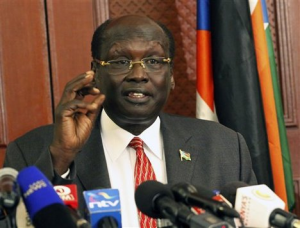South Sudan says Sudan still bombing, won’t be dragged to war
By Yara Bayoumy
NAIROBI (Reuters) – South Sudan said on Monday Sudanese forces were still bombing regions in the oil-producing area straddling their border, but insisted it would not be dragged into war.
South Sudan’s Information Minister Barnaba Marial Benjamin accused Khartoum of wanting to deter investment in the crucial oil sector of the country that split from the north in July.
Western nations fear the latest border clashes could escalate to a full-blown civil war between the mainly Muslim north and the South where most have either Christian or animist beliefs.
“For the last month, the Republic of Sudan in Khartoum has been bombing mostly the Unity state and our oil fields. For the last month, they’ve been bombing villages and small towns and as we speak today they are still continuing bombing some of these areas,” Benjamin told reporters in the Kenyan capital, Nairobi.
“They are still continuing at random all over Unity State, of course the purpose also is (to) sabotage the investment in oil,” he said.
Sudan’s army spokesman has denied allegations made by South Sudan that it had attacked Manga and Panakuach in Unity State.
South Sudan became independent from the north under a 2005 peace agreement that ended decades of civil war which killed 2 million people.
Benjamin said South Sudanese President Salva Kiir was adamant the country would not be dragged back into conflict.
“We will not be dragged into the war … but we will defend the territorial integrity of our country,” Benjamin told reporters. “We will not cross into the Republic of Sudan but we will protect our territorial integrity.”
Benjamin said the government in Juba was confident outstanding issues, including a border dispute and a row over citizenship could be resolved through peaceful dialogue using the African Union and other international organisations.
TALKS IN ADDIS ABABA
The two governments were expected to resume delayed negotiations later on Monday, members of an African Union panel mediating the talks told Reuters.
“They (talks) are still continuing, but while they are continuing, they are bombing us,” Benjamin said, adding that Sudan’s defense and foreign ministers should be in the Ethiopian capital by now.
The two sides also need to decide how much landlocked South Sudan must pay to export its crude oil through Sudan. Juba has shut down its entire oil production to stop Khartoum seizing oil as compensation for what Khartoum calls unpaid transit fees.
South Sudan has said it is prepared to pay up to $1 per barrel in transit fees – well below the $36 Benjamin said Khartoum has been demanding.
In the meantime Benjamin said South Sudan had signed contracts with an American company and a Chinese company to build two refineries.
“These refineries are for the time being to meet some local needs and needs in the region,” he said, adding the U.S. company was from Texas while the Chinese company was already on the ground. He gave no further details.
Both countries have also yet to mark a 1,800 km (1,200 mile) border, much of which is contested, or find a solution to the disputed border region of Abyei. Each side also accuses the other of supporting rebels on each other’s territory.
Benjamin criticized the African Union for its slow pace in moving to mediate between the two parties.
“The AU is sitting pretty … We are asking the African Union if they cannot double their steps so that they can bring a positive solution to these problems, then IGAD (regional group) should not sit around.”
(Editing by Richard Lough and Alison Williams)










